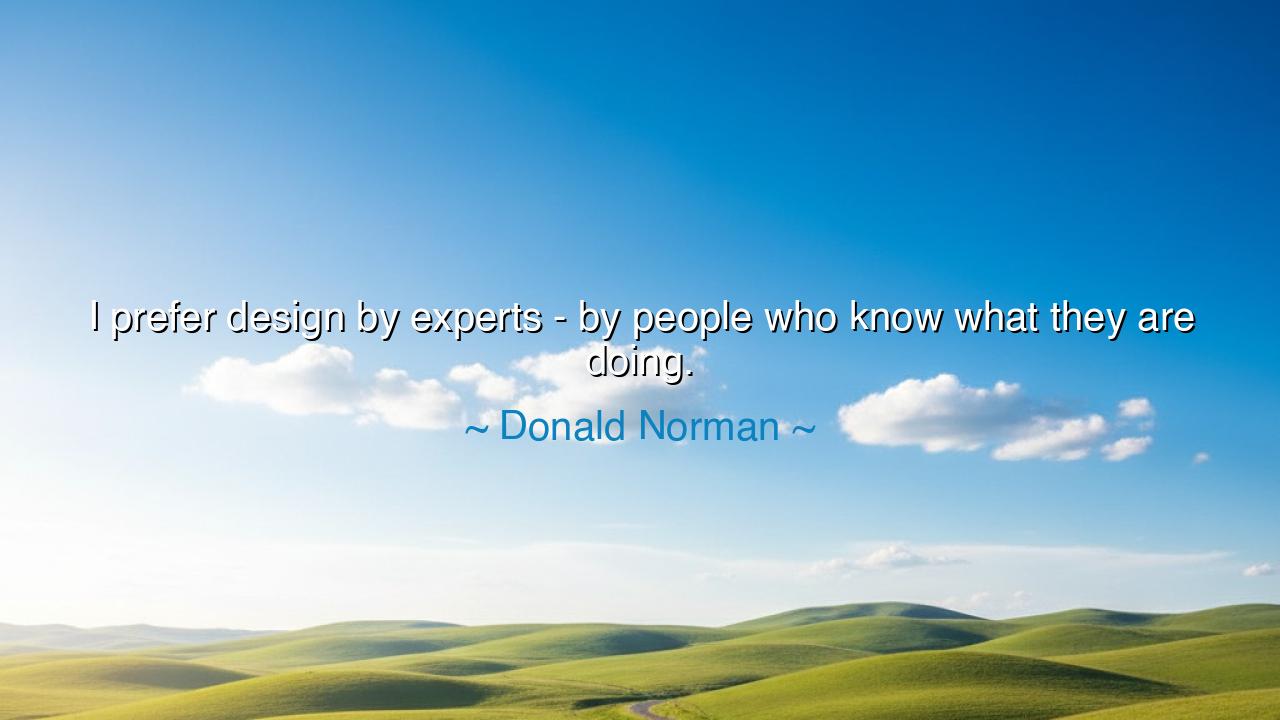
I prefer design by experts - by people who know what they are






“I prefer design by experts — by people who know what they are doing.” – Donald Norman
In this simple yet commanding declaration, Donald Norman, the great philosopher of usability and human-centered design, reminds us of a truth as old as craftsmanship itself: that wisdom and mastery are not born of accident, but of experience, discipline, and understanding. When he says he prefers design by experts, he is not merely demanding credentials or status; he is invoking the sacred respect for those who have labored long in their art, who have stumbled, refined, and endured until their skill has become second nature. His words are not about arrogance — they are about reverence for mastery, the kind that is earned through years of thought, creation, and humility before the craft.
In every era, the ancients understood this principle. The temple builders of Egypt, the shipwrights of Greece, the sculptors of Florence — all were guided by the same truth that Norman now voices. They entrusted their sacred works not to the untrained or the impulsive, but to those who knew their materials as a shepherd knows his flock, who could foresee the weakness in stone before it cracked, who could shape beauty not by luck but by law. The expert, in Norman’s sense, is not one who merely does the work, but one who understands the invisible principles beneath it — the harmony between form and function, the balance between utility and grace.
Consider the story of the Parthenon, the great temple that crowns the Athenian Acropolis. It was not built by chance, nor drawn by untested dreamers, but by Ictinus and Callicrates, masters of geometry and proportion. They knew that perfection in design was not achieved by simplicity alone, but by subtle correction — by bending the columns ever so slightly inward, curving the steps just enough to fool the human eye into perceiving divine harmony. To the untrained, the Parthenon seems effortless. Yet behind its serenity lies the labor of those who knew what they were doing. In that, we see the essence of Norman’s wisdom: that true design feels natural only when forged by minds that have conquered complexity.
Norman himself came to this conviction through a lifetime of observing failure — designs made by those who did not understand the human mind. He saw devices, interfaces, and structures that confused, frustrated, and alienated the very people they were meant to serve. He learned that when design is left to amateurs or committees driven by fashion rather than function, chaos enters the world. A poorly designed door, a misleading symbol, an incoherent layout — these small failures become daily burdens upon human life. But when experts design — when those who truly grasp human behavior and the nature of systems create — life flows more easily, and beauty aligns with purpose.
The wisdom here extends beyond design; it touches all creation. In the building of nations, in the teaching of minds, in the tending of souls, the same law applies. To entrust great works to those without knowledge or discipline is to sow disorder and disappointment. Yet in every field, we see the temptation to favor haste over expertise, opinion over understanding. Norman’s words stand as a counterweight to this folly — a call to seek mastery over mediocrity, to prize skill over convenience, and to honor those who have walked the long road of learning.
And yet, Norman’s saying is not a gate that bars entry to the novice. It is a pathway, showing where true excellence lies. Every expert was once a beginner, fumbling in the dark. The difference is that the expert persisted — they learned, they failed, they studied, and they grew until they could see not only the surface of things, but the truth beneath them. Thus, his message is both a celebration and a challenge: to become one who knows what they are doing, and to respect those who already do.
So, my child of the future, take this teaching into your hands. Do not fear the slow apprenticeship of mastery. Do not dismiss the counsel of those who have walked before you. When you build, build with understanding. When you create, do so not to impress, but to endure. Trust the experts, yes — but also strive to become one yourself. For only through patience, humility, and practice can one reach the state where action flows without error, where design serves both body and spirit, and where every creation — be it a tool, a word, or a life — bears the mark of those who truly know what they are doing.






AAdministratorAdministrator
Welcome, honored guests. Please leave a comment, we will respond soon